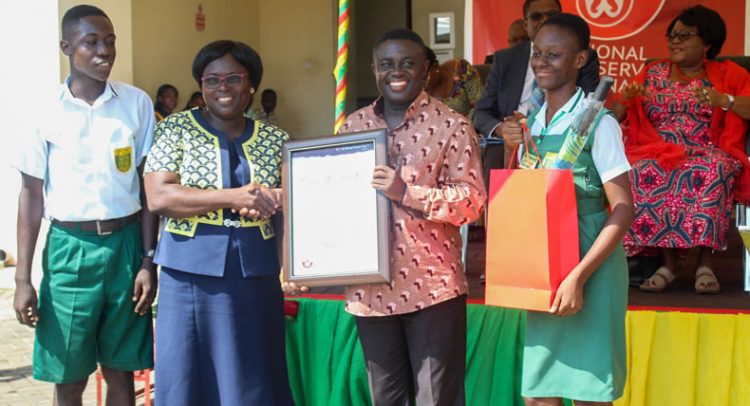One of the schools receiving their award
The National Blood Service Ghana (NBSG) has raised concerns about the inadequate supply of voluntary blood donation in Ghana.
According to the NBSG, only six out of every 1,000 population in any community in Ghana gave blood in 2017.
“This is woefully inadequate for a middle income country such as ours where the minimum BCI/1000 population should be 10 by WHO standards. This indicator is a measure of whether we are meeting the demands of blood or not, and clearly, we are not,” Dr Justina Kordia Ansah, CEO of NBSG, indicated.
She said Ghana has an estimated population-based blood requirement of 270,000 unit of blood but only 160,000 unit of blood are collected, which leaves the country with a deficit of 40 percent.
“The demand for blood in Ghana always outstrips supply. There is constant need for blood to save the lives of patients in emergency and non- emergency situations,” she added.
Dr Ansah further stated that the dire situation compromises the safety of the blood and blood components for patient care in health facilities.
She was speaking at the occasion of the 2018 World Blood Donor Day commemoration themed ‘Blood Donation As An Action of Solidarity’, with the slogan ‘Be There For Someone Else, Give Blood, Share Life’.
Dr Ansah added that the country can move away from the worrying situation if every healthy person living in Ghana, both male and female under the ages of 17- 60 years, will make it a point to donate blood.
“Giving blood voluntarily and repeatedly is the key to sustaining supply of adequate safe blood and blood products for our country in this respect, the National Blood Service actively engages all relevant stakeholders to support the mandate of the Service in providing safe, adequate and efficacious, blood and blood products, making it timely, accessible and affordable,” she said.
The Deputy Minister of Health, Madam Tinah Mensah, emphasized the need for Ghana to move away from the family replacement system of voluntary blood donation in order to attain the 100 percent voluntary blood donation target as set by the WHO to be achieved by the year 2020.
“The government of Ghana through the Ministry of Health is committed to achieving this target by prioritising the passage of the NBSG Bill to provide the requisite legal framework to accelerate progress towards its achievement,” Madam Mensah stated.
Dr Owen Kaluwa said that blood transfusion saves lives, adding that it is how ordinary people can be there for someone else— by giving blood and sharing life.
He, however, maintained that although African countries have made significant progress to improve the availability and safety of blood, the demand of blood transfusion is increasing.
“The region is not meeting its blood needs, and many patients requiring transfusion are dying because of blood shortages,” he said.
“I urge us all to support voluntary blood donations as a solidarity act, and urge the government and all stakeholders to ensure that the NBSG have a sustainable funding for blood safety programmes,” Dr Kaluwa added.
Institutions and schools which have contributed voluntarily to blood donation were awarded for their contributions.
By Jamila Akweley Okertchiri & Juliana Naki Odonkor


